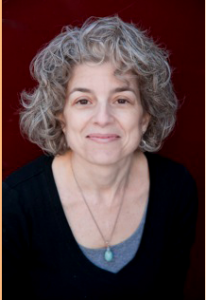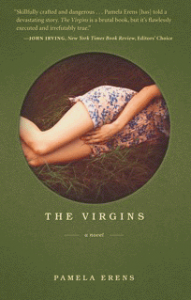Bonnie ZoBell: Hi Pamela. I appreciate your talking about your wonderful  new book, The Virgins, today. I can’t say enough about how excellent the tension in the novel is. You made me stay up way too late a few nights. And it’s such a relief it’s not all based on car chase scenes and murders. A lot of it has to do with how, at a certain point when your narrator is writing from a point in the future, he starts to refer to one of your main characters in the past tense—we have no choice but to keep reading. But the passion between Seung and Aviva is so heightened as well, and the devilish narrator’s comments keep reminding us that trouble is coming.
new book, The Virgins, today. I can’t say enough about how excellent the tension in the novel is. You made me stay up way too late a few nights. And it’s such a relief it’s not all based on car chase scenes and murders. A lot of it has to do with how, at a certain point when your narrator is writing from a point in the future, he starts to refer to one of your main characters in the past tense—we have no choice but to keep reading. But the passion between Seung and Aviva is so heightened as well, and the devilish narrator’s comments keep reminding us that trouble is coming.
Pamela Erens: I’m glad you found The Virgins suspenseful! I worried for a long time that readers wouldn’t because the structure of the novel is highly episodic. It’s one thing and then another thing and then another. My editor at Tin House, Tony Perez, had a couple of suggestions for planting some clues early on as to what was going to happen, to make sure the reader understood that this was all actually going somewhere, that it was building to a significant event. So you can thank him for that.
BZ: And speaking of that narrator, he’s utterly fascinating. Bruce Bennett-Jones is not only devilish but dangerous and tries to rape Aviva the second time he sees her. I love the risk involved in having him as your narrator. Did you decide that from the beginning, or did he develop into your narrator later.
PE: I decided on Bruce as narrator quite early. It’s what brought the book together in my mind: the use of this fake-omniscient narrator who would show us scenes he couldn’t possibly have witnessed, but (hopefully) make us believe in them. It made the writing of the novel more interesting for me—now it was not just about a love triangle (my original conception) but also about storytelling itself, about how we piece “the truth” together. By the way, I’m interested to hear you use the word rape to describe that encounter between Bruce and Aviva. Many other readers have done the same, and it continues to surprise me, because to me “rape” means intentionally trying to force someone into sexual acts against their will. Bruce is lost enough in his own head that he doesn’t think he’s forcing Aviva; he believes she’s going along with him. When she makes it absolutely clear she’s not, Bruce backs off. But I don’t have the patent on the term rape, and I’ve realized that others’ interpretations are as valid as mine.
BZ: I also like the way that in both this novel and your last, The Understory, you pick characters so unlike yourself and do such a good job with them. Do you prefer main characters unlike yourself? How do you pick your characters?
PE: I do prefer main characters at some distance from myself. It makes it easier for me to envision them. In addition it makes it easier to allow them to be ugly or “not nice”; I don’t feel implicated. I’m working on a new novel now which has a main character who is (gasp!) female and whose situation, at least in its basics, is one I’ve been through, and it’s much more difficult!
I’m not sure I think of myself as “picking”characters. They appear, and if they hang around in my mind for long enough, and accumulate enough details and felt reality around them, then they may stick.
BZ: The fact that Seung is Korean-American and has very old-school parents really helps develop the shame being used in the book. In fact, the way your novel uses emotion as a way to drive the plot reminds me somewhat of Edgar Allan Poe’s work, the way the emotion is so palpable, though of course his writing is very different. But 1979 wasn’t that long ago, not enough to shape the kind of shame and scandal going on in the story. I think it mostly has to do with Seung’s cultural background and the fact it’s an East Coast boarding school. I’d love to hear your thoughts on this.
PE: Interesting question. Yes, Seung has a cultural background that emphasizes shame, but I think young women of all backgrounds have always been very vulnerable to shame in the sexual arena—to feeling that they have too much sex, or too little sex, or the wrong kind of sex, or the wrong kind of emotions; I really don’t believe that this was at all passé by 1979, nor is it passé now. I do agree that the boarding school environment—that is, living in the same place you go to school, so that you are subject to the laws and mores of the institution at all times, not just from 8 to 3—can magnify feelings of shame if you are crossing those laws and mores, if you’re not the model of the School X student. Say if you’re not Waspy, if you don’t have Yankee manners and attitudes, or if you get caught in some transgression which everybody—everybody—is going to know about.
BZ: What were you up to in 1979? What were your high school years like?
PE: I was in fact at boarding school! I loved boarding school, as it happens. I’d been at a small private school from pre-kindergarten on, and boarding school was a chance to reinvent myself, just as Aviva hopes to reinvent herself but finds this a vexed project. People think of boarding school as snobbish and moneyed—yet for me it was much lower-key than my private school had been. People were much less materialistic, less interested in designer clothes and cars and the right haircut. There was no real point in being interested in clothes and cars when you weren’t allowed to have a car and you couldn’t go out somewhere cool at night. And the kids were much more willing to be openly intellectual, to be readers, to think and debate about stuff. It was a step into a world I liked much better.
BZ: As a West Coaster, I’ve always found East Coast boarding schools kind of mysterious. Don’t the kids and parents miss each other? Are there always scandals at them because they’re so insular? Why do you think there aren’t more of them on the West Coast?
PE: I definitely remember homesickness among the younger kids. I was a little older when I went, and in general my new friends and I were kind of thrilled at the independence from family. If the West Coast has fewer boarding schools, I’m assuming that’s because such schools come out of an English tradition of sending kids away for their education. The East was settled earlier than the West, and settled more heavily initially by the English—so there you go.
As to scandals—yes, definitely, the enclosed environment leads to them. Most of the scandals seem to be sex scandals. You have teachers living round the clock with students. There are seductions, there are power dynamics.
BZ: What writing are you working on these days?
PE: As mentioned, a new novel. I haven’t written a short story in eight years. I love short stories and keep hoping I’ll one day write a good one or two, but my bent seems much more toward novels.


Well you have definitely made me want to check out ‘The Virgins’, thanks for a great conversation.
It’s definitely one of my favorite books this year, Susan. The passion, the suspense, the same–it’s amazing! Thanks for stopping by.
Loved reading it all. Thanks, ladies.
Thanks for coming by, Avital! Pamela was a pleasure to interview.